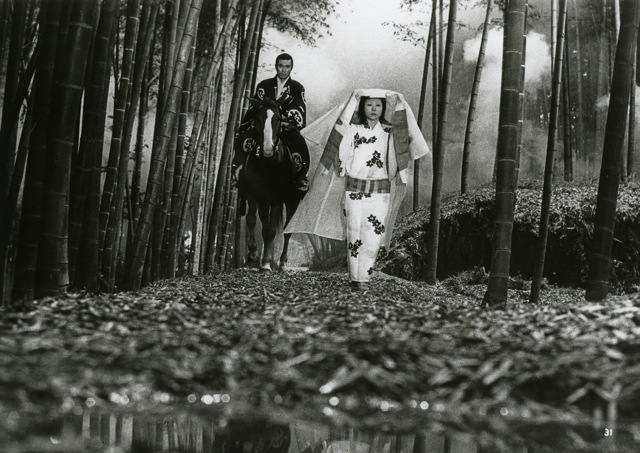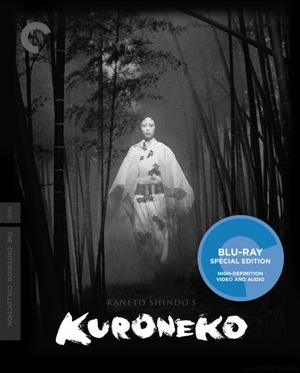CHICAGO – Patrick McDonald of HollywoodChicago.com audio review for the doc series “Charlie Hustle & the Matter of Pete Rose,” about the rise and bitter fall of the major league legend, the MLB’s all-time hits leader, only to be banned from the sport because of gambling. Streaming on MAX and on HBO since July 24th.
Blu-Ray Review: ‘Kuroneko’ Hauntingly Foreshadows Modern Asian Horror
CHICAGO – Halloween just isn’t the same without an Onryō. Thanks to America’s tireless remakes of Japanese horror films, the materialization of Onryōs in pop culture has become as much of a seasonal tradition as witches and goblins. They’re often characterized by long black hair, white robes, bodily contortions, tragic backstories and an unquenchable thirst for vengeance beyond the grave.
In short, Onryōs unnervingly embody the old adage that “Hell hath no fury like a woman scorned…even a dead one.” It’s easy to see how spine-tingling modern classics like “Ringu” and “Ju-on: The Grudge” followed in the ghostly footsteps of Kaneto Shindô’s overlooked 1968 masterwork, “Kuroneko” (“Black Cat”). Though the film is more hypnotic than scary, it still manages to creep under the skin as it spins a tale of real emotional and erotic power.
 Blu-Ray Rating: 5.0/5.0 |
As in Shindô’s better-known 1964 classic, “Onibaba,” this film centers on two women—one old, one young—who kill samurai. The only difference here is that the women are in fact vengeful spirits whose lives came to an abrupt end after a savage samurai attack. A chilling silence fills the air as a band of samurai stealthily approach the house that they intend to leave in flames. The subsequent rape scene is as disturbing a violation as the similarly devastating sequence in Ingmar Bergman’s 1960 effort, “The Virgin Spring.” When the women are resurrected in supernatural form, they possess qualities mysteriously evocative of their pet cat (thus making them instant soul mates with the “Grudge” Onryōs). In the film’s chilling first third (which could easily work as its own self-contained film), apparitions taking the form of the motherly Yone (Nobuko Otowa) and the radiantly sensual Shige (Kiwako Taichi) seduce and murder various samurai in their eerily restored house, which appears to glide through the trunks of the bamboo forest. There are stunning shots of the ghosts somersaulting over their prey while illuminated against the jet-black sky. Abrupt bursts of blood-spattered violence prove to be as startling as the nude scenes performed by Taichi, who finds herself falling for Gintoki (Kichiemon Nakamura), the samurai sent to wipe out the spirits once and for all.

Kaneto Shindô’s 1968 masterwork Kuroneko gets new life on Criterion.
Photo credit: The Criterion Collection
The samurais’ arrogant view of peasants as inhuman animals ripe for pillaging makes them no less detestable than the modern day soldiers guilty of committing atrocities against innocents. In fact, there‘s an unsettling resonance to several of the film’s themes, such as the unrelenting vice grip of revenge on the soul and how it can purge sensible beings of their humanity until they’re essentially ghosts of their former selves. Otowa’s performance is mesmerizing, especially as the faint glow of satisfaction appears on her face while regarding the corpse of her latest victim. Taichi is utterly ravishing in her scenes with Nakamura, who nails the film’s most complex role. He’s engaging and oddly funny in his early scenes, with his disheveled appearance and exuberant energy. Yet once he takes on the role of a uniformed samurai, Nakamura transforms into a self-contained adult determined to unlock the mystery of his fellow fallen warriors. A superb plot twist midway through the picture adds poignant and provocative complexity to the plot, leading to a climax as psychologically intense as it is visually arresting. “Kuroneko” stands as a landmark in Japanese film history that fused the sensibilities of Eastern ghost yarns and Western horror classics into a deliriously expressionistic brew. Hopefully this pristine Criterion release will introduce new generations to the work of Shindô, who recently finished writing and directing his latest film at the slim age of 98.
 Kuroneko was released on Blu-Ray and DVD on Oct. 18, 2011. Photo credit: The Criterion Collection |
“Kuroneko” is presented in impeccable 1080p High Definition (with a 2.35:1 aspect ratio) that does full justice to cinematographer Kiyomi Kuroda’s gorgeously poetic compositions. Shindô is in good spirits during a one-hour interview from the Directors Guild of Japan, conducted by his former assistant director Seijirō Koyama (“Hachijko Monogatari”), who began collaborating with him on 1965’s “A Scoundrel.” It’s fascinating to hear Shindô openly reminisce about his wealthy farming family, the bankruptcy that caused him to reluctantly move to the city, and the connection he’s continued to feel with agrarian communities. The autobiographical streak in his work was apparent right from the beginning in his directorial debut, “Story of a Beloved Wife,” which was based on his late wife. Kenji Mizoguchi served as Shindô’s mentor, and it’s clear that the elder legend’s 1953 masterwork, “Ugetsu” served as a major inspiration to his apprentice. Shindô admitted that the 43 volumes of “Collected Modern Theatre” recommended by Mizoguchi served as the extent of his research into drama, but the directors did not always see eye-to-eye. Whereas Mizokuchi was not keen on visual representations (he once declared, “A flower can’t act!”), Shindô sought to utilize symbolism in his work.
The only thing lacking from this excellent conversation is any specific insight into “Kuroneko,” but the accompanying interview with Japanese film critic Tadao Sato offers a great deal of historical and cultural context to the picture. Sato notes that ghost films used to be released every summer in Japan because of the Bon Holidays, where spirits were welcomed into homes, thus making them a part of everyday life. Though wires were commonly used in Kabuki theatre, and are clearly visible in “Kuroneko”’s climactic flying sequence, they were manipulated in news ways by Shindô to mimic the movement of a cat. In the essay booklet, critic Maitland McDonagh argues that the film’s chance of being embraced by a wide audience upon its initial release was doomed by the 1968 Cannes Film Festival, which was shut down halfway through by filmmakers (including François Truffaut) protesting the firing of Cinémathèque Française co-founder Henri Langlois. There’s also an excerpt from a 1972 interview by film scholar Joan Mellen in which Shindô discusses the film’s sociopolitical subtext, as well as his use of symbolism. The bushes surrounding Yone and Shige’s home in the film’s unforgettable opening shot are meant to represent the society that surrounds people. In Shindô’s words, “I wanted to convey the lives of down-to-earth people who have to live like weeds.”
 | By MATT FAGERHOLM |


